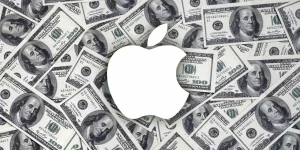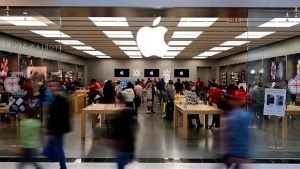Why did a Cost of Apple’s Price fall By $1 Trillion in 2023? Apple has decreased its market value by $1 trillion over the past 365 days, a significant milestone that its owners certainly didn’t want to see happen. The company’s shares have increased recently, but the steep decline in value illustrates the challenging economic conditions facing businesses not just in the tech sector but across all industries. We will attempt to address all of the variables that contributed to such a significant loss in this essay, as there was obviously not a single cause for all of that loss.
A change in consumption patterns from the epidemic era, which turned around the fortunes of both large and small businesses, is the main reason why Apple and other corporations have experienced significant devaluation. Another significant aspect was the rise in inflation, which prompted the Federal Reserve to intervene aggressively, and supply chain disruptions, which subsided but continued with zero-COVID lockdowns in China. Senior industry analyst at CFRA Research, Angelo Zino, told ABC News.
Read More:‘Adobe Flash Player is No Longer Supported’ Fix Error
“You’re talking about the economy losing $1 trillion in one stock; it’s a massive amount and it shouldn’t be overlooked,”
Apple, like many other computer companies, has been harmed by a significant consumer shift away from the pandemic-era concentration on purchasing goods.

At the height of the pandemic, millions of people who were subject to lockdowns around the world switched their restaurant spending for couches, exercise bikes, and tech items. For instance, Apple’s profits during the first three months of 2021 increased significantly when compared to the same time last year.
This shift in consumer preferences has hurt Apple’s and other tech companies’ bottom lines.
Since the pandemic has subsided, more individuals are spending money on travel, dining, and sporting events rather than on consumer devices.
The iPhone 14 and iPhone 14 Plus’s identical core CPUs are another factor in the embarrassing sales and eventual devaluation of the iPhone 14 series. Since these are all A15-era chips, many customers choose not to purchase them. The iPhone 14 and iPhone 14 Plus do not significantly improve on the iPhone 13 or 13 Plus in terms of other cameras, screens, etc.
In addition, Apple is also experiencing capacity issues brought on by the epidemic at Foxconn’s Chinese facility. According to numerous rumours, Apple is considering changing the model specifications and cost of the iPhone 15 series for the following year in order to increase the appeal of the entry-level model.

In theory, a rise in the benchmark interest rate should reduce inflation by slowing the economy and eroding demand by increasing borrowing costs for firms and consumers. As a result, it is more difficult for borrowers—whether they are individuals or businesses—to obtain loans, which are essential for maintaining the economy.
Investors often leave when interest rates are raised because of the negative effects on the economy and company profits. Since investors first selected tech stocks like Apple based on their rapid earnings growth, which now seems increasingly improbable as interest rates rise, this suffering is especially acute for those companies.
Consumers may be burdened by high pricing and growing borrowing expenses, which can eat away at savings and prevent them from buying on things like iPhones or MacBooks.
Savings from the epidemic contributed to the consumer spending’s resilience for much of the year, but the safety net seems to have diminished recently. According to information from the Commerce Department, the personal savings rate decreased to 2.3% in October, the lowest level in in two decades.



